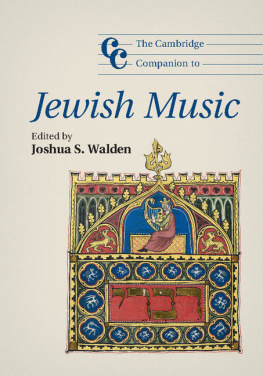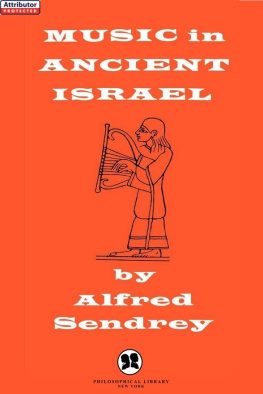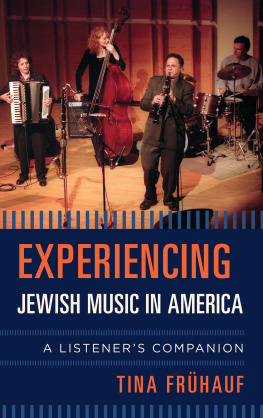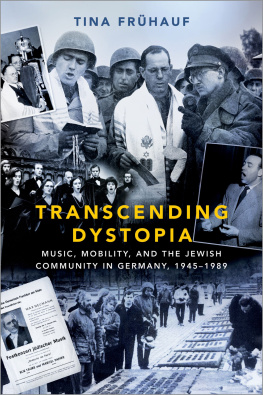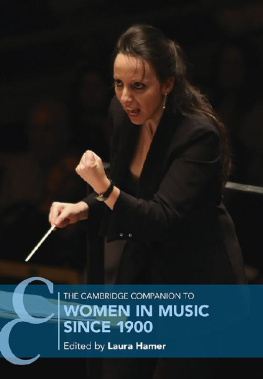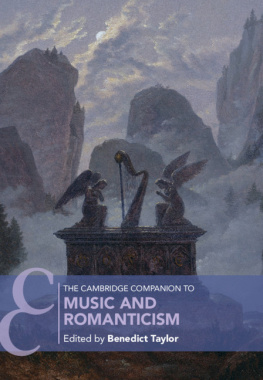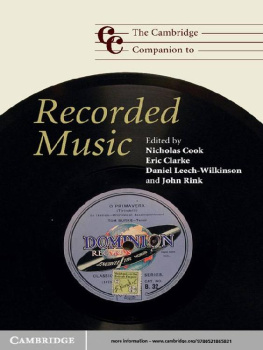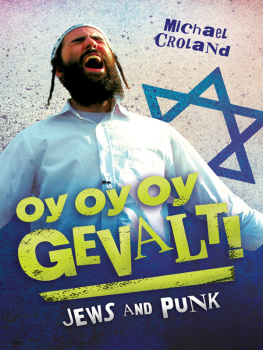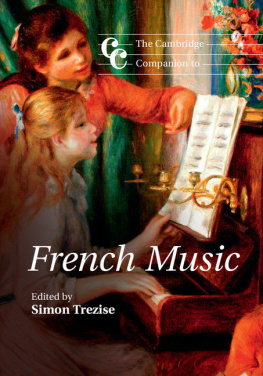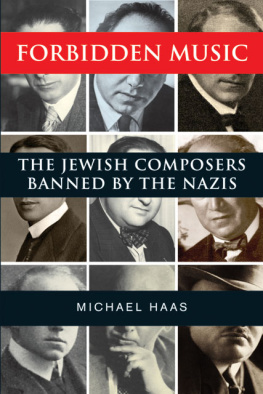Cambridge University Press is part of the University of Cambridge.
It furthers the University's mission by disseminating knowledge in the pursuit of education, learning and research at the highest international levels of excellence.
This publication is in copyright. Subject to statutory exception and to the provisions of relevant collective licensing agreements, no reproduction of any part may take place without the written permission of Cambridge University Press.
Printed in the United Kingdom by TJ International Ltd. Padstow Cornwall
Cambridge University Press has no responsibility for the persistence or accuracy of URLs for external or third-party internet websites referred to in this publication, and does not guarantee that any content on such websites is, or will remain, accurate or appropriate.
Joshua S. Walden
Philip V. Bohlman is Mary Werkman Distinguished Service Professor of Music and Humanities at the University of Chicago and Honorarprofessor at the Hochschule fr Musik, Theater und Medien Hannover. Among his recent books are Revival and Reconciliation: Sacred Music in the Making of European Modernity (2013) and Wie sngen wir Seinen Gesang auf dem Boden der Fremde! Jdische Musik zwischen Aschkenas und Moderne (2016). He is Artistic Director of the New Budapest Orpheum Society, with whom he received the AMS Noah Greenberg Award for the CD As Dreams Fall Apart: The Golden Age of Jewish Stage and Film Music, 19251955 (2014).
Theodore W. Burgh is Associate Professor at the University of North Carolina Wilmington, in the Department of Philosophy and Religion. He completed his graduate work at the University of Arizona. Burgh is an archaeologist who works in Jordan and Israel. His sub-specialty is archaeomusicology, and he examines the use of music in ancient Israel. He explores music, depictions of musical activity, and musical instruments to study various aspects of past cultures. He has contributed a number of articles and chapters on archaeology and ancient music culture. He is also a professional musician and composer.
Judah M. Cohen is the Lou and Sybil Mervis Professor of Jewish Culture and Associate Professor of Musicology at the Indiana University Jacobs School of Music. He is the author of The Making of a Reform Jewish Cantor: Musical Authority, Cultural Investment (2009), and Sounding Jewish Tradition: The Music of Central Synagogue (2011). Recent articles include the Jewish Music article in the second edition of the Grove Dictionary of American Music , and the Music entry for Oxford Bibliographies in Jewish Studies. He has also published extensively on Caribbean Jewish history and HIV/AIDS and the arts in Africa.
David Conway is an Honorary Research Fellow at the Department of Hebrew and Jewish Studies of University College London. He is the author of Jewry in Music (Cambridge, 2012) and has published articles in The Wagner Journal, Jewish Renaissance , and Hubodn ivot . He is a committee member of the British Alkan Society and of the International Centre for Suppressed Music. Conway is the founder and musical director of the annual music festival Indian Summer in Levoa (Slovakia), which regularly features music by Jewish composers of the past two centuries. He also works for the European Commission as a senior expert on development aid programs in the countries of the former Soviet Union.
Tina Frhauf teaches at Columbia University and is editor at Rpertoire International de Littrature Musicale in New York. She has received multiple fellowships and grants, most recently from the American Musicological Society, the Leo Baeck Institute, and the Memorial Foundation for Jewish Culture. She has published articles in Musical Quarterly , Musica Judaica , and TDR: The Drama Review , and contributed numerous book chapters on German Jewish music culture. She is the author of The Organ and Its Music in German-Jewish Culture (2009/2012), and editor of An Anthology of German-Jewish Organ Music (2013), Hans Samuel: Selected Piano Works (2013), and Dislocated Memories: Jews, Music, and Postwar German Culture (2014). Frhauf is currently completing a monograph on music in the Jewish communities of Germany after 1945.
Lily E. Hirsch is a Visiting Scholar at California State University, Bakersfield. She has published the books A Jewish Orchestra in Nazi Germany: Musical Politics and the Berlin Jewish Culture League (2010) and Music in American Crime Prevention and Punishment (2012), and is co-editor of Dislocated Memories: Jews, Music, and Postwar German Culture (2014). Her research has also appeared in Rethinking Schumann , Sound Studies , Musical Quarterly , Philomusica , the Journal of Popular Music Studies , American Music , Music & Politics , Popular Music , Popular Music and Society , The Guardian , and the journal Law, Culture, and the Humanities , among other publications.
Jehoash Hirshberg is a Professor Emeritus in the Musicology Department, Hebrew University, Jerusalem. He holds a Ph.D. from the University of Pennsylvania (1971). His diverse fields of research include the music of the fourteenth century, the Italian violin concerto at the time of Vivaldi (with Simon McVeigh of Goldsmiths, University of London), and Italian opera in the decade of unification, 186070. He has primarily concentrated on music in the Jewish society of Palestine during the years of the British mandate and in the early years of Israel, having published a historical study (1996) and monographs on the composers Paul Ben Haim, Alexander U. Boskovich, and Yehezkel Braun (forthcoming), as well as numerous articles on that subject.

